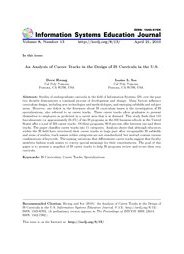Volume 8
Volume 8, Number 13 |
April 21, 2010 |

|
Drew Hwang
Louise L. Soe
|
Abstract: Studies of undergraduate curricula in the field of Information Systems (IS) over the past two decades demonstrate a continual process of development and change. Many factors influence curriculum design, including new technologies and methodologies, and emerging subfields and subject areas. However, one deficit in the literature about IS curriculum issues is the investigation of IS specializations, also referred to as career tracks. These career tracks allow graduates to present themselves to employers as proficient in a career area that is in demand. This study finds that 110 baccalaureate (or approximately 24.4%) of the IS programs in the 450 business schools in the United States offer a total of 304 career tracks. Of these programs, 80.9 percent offer between one and three tracks. The paper classifies career tracks into 11 categories. Analysis shows that although educators within the IS field have structured their career tracks in large part after recognizable IS subfields and areas of studies, track names within categories are not standardized, but instead contain various combinations of keywords. The naming variations that differentiate career tracks suggest that faculty members fashion track names to convey special meanings for their constituencies. The goal of this paper is to present a snapshot of IS career tracks to help IS programs review and revise their own curricula.
Keywords: IS Curriculum, Career Tracks, Specializations
Download this issue: ISEDJ.8(13).Hwang.pdf (Adobe PDF, 17 pages, 883 K bytes)
Preview the contents: Hwang.j.txt (ASCII txt, 43 K bytes)
Recommended Citation: Hwang and Soe (2010). An Analysis of Career Tracks in the Design of IS Curricula in the U.S. Information Systems Education Journal, 8 (13). http://isedj.org/8/13/. ISSN: 1545-679X. (A preliminary version appears in The Proceedings of ISECON 2009: §3514. ISSN: 1542-7382.)